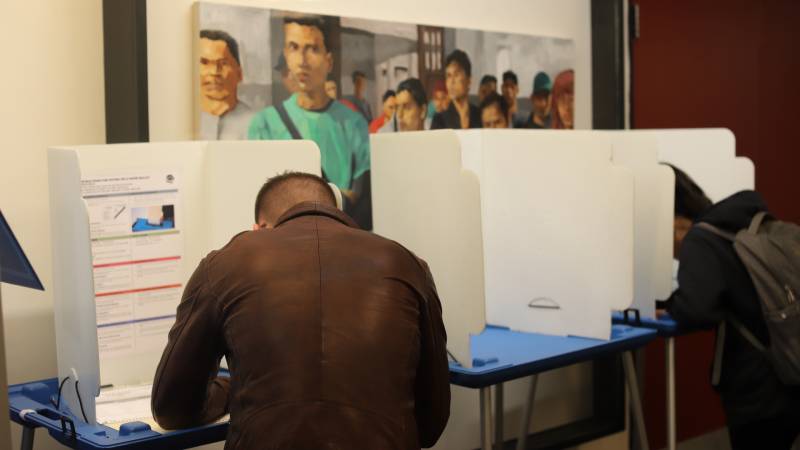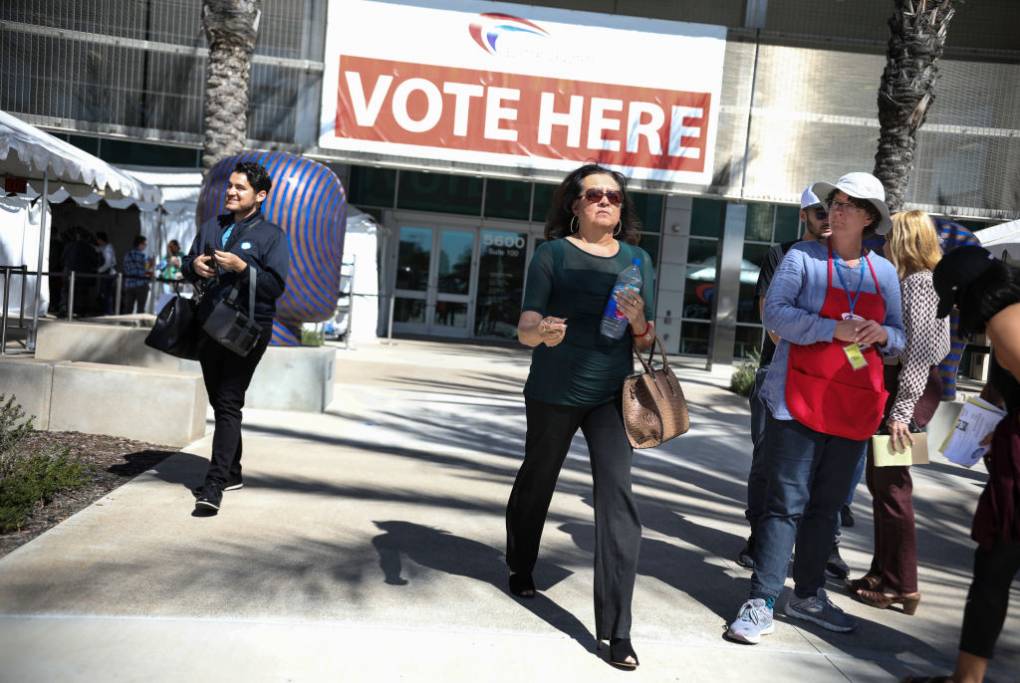Long lines in Los Angeles County prompt Sanders complaint
By JANIE HAR
57 minutes ago
1 of 11
Voters wait on line at a polling station at the University of Southern California on Tuesday, March 3, 2020. Some California voters are waiting in long lines because of technical glitches connecting to the statewide voter database or too many users trying to cast ballots at once. The secretary of state’s office said election workers in 15 counties could not connect to the statewide voter registration database on Super Tuesday but that the issues have been resolved. (AP Photo/Stefanie Dazio)
SAN FRANCISCO (AP) — Technical issues plagued voting sites throughout California on Tuesday, including in the nation’s most populous county, where long lines and an overloaded new voting system prompted a legal complaint from Democratic presidential candidate Bernie Sanders.
Los Angeles County rolled out a $300 million election system that raised concerns about technical and security defects even before glitches caused frustration and confusion at polling places. Sanders asked for voting centers to stay open an extra two hours, saying voters were denied their constitutional right to vote.
In California, whose primary Sanders went on to win, anyone in line by 8 p.m. can cast a ballot.
Separately, election workers in 15 counties, including Fresno, Napa and Sacramento, faced technical problems connecting to the statewide voter registration database, said Sam Mahood, spokesman for the secretary of state’s office.
He said there was no evidence of malicious activity but did not explain what caused the failure. Mahood also said the secretary of state’s website experienced intermittent outages due to higher-than-normal traffic and that technicians added server capacity.
California is among 14 states that held presidential primary contests on Super Tuesday, and voters in the most populous state also weighed in on congressional races, legislative seats and a statewide school bond.
In Los Angeles County, which has more than a quarter of the state’s 20 million registered voters, electronic pollbooks operated slowly because so many voters were trying to use them at the same time, said Mike Sanchez, a spokesman for the county registrar.
Some locations saw delays of two hours or more, including at the University of Southern California and in Beverly Hills.
The complaint from the Sanders campaign reported a wait exceeding four hours in one location and check-in stations and voting machines that were not working. It requested vote centers stay open until 10 p.m.
Terina Keresoma, a spokeswoman for the registrar’s office, said she could not comment on the complaint other than to say people in line by 8 p.m. would be allowed to vote.
Technicians added more devices in some polling places to speed up lines, the registrar’s office said earlier. There was no indication of security breaches with the pollbooks, which are hooked up to the state’s voter database.
USC students said the delays appeared to be at check-in, where voters either needed to register for the first time or get a provisional ballot because they live outside Los Angeles County.
Jimmy Huber, 22, of Whittier in LA County, said there weren’t enough workers checking in voters. He waited about 90 minutes.
“After that, you could go straight to any of the machines,” he said. “It goes quickly once the human part’s done.”
Richard Gonzalez, 20, of Tracy in San Joaquin County, said poll workers began handing out pink provisional ballot forms while he was in line, which sped up the process once he got inside.
The state certified Los Angeles County’s new elections system despite serious technical and security defects identified in testing. That includes the ability of an attacker to bypass seals, locks and sensors and boot from a USB port, which could allow election data to be modified. Testers also found the machines were susceptible to paper jams at five times the acceptable rate.
Election integrity activists had warned that the system was bound to experience serious failures and should never have been certified for use. The conditional certification was contingent on several defects being remedied — after Tuesday’s primary.
In Beverly Hills, city spokesman Keith Sterling estimated people were waiting two hours or more. The city of 35,000 has sued LA County over the new voting system’s user interface, calling it severely flawed.
One possible explanation for long lines at some places is that the new system allows people, for the first time, to vote wherever they like in Los Angeles County.
“There’s a lot of frustration, (and) people walk away. I don’t know if they’ll come back. I hope they do,” Beverly Hills City Council member Julian Gold said.
The issues with the secretary of state’s office slowed down operations at Contra Costa County near San Francisco into the evening, said Scott Konopasek, assistant registrar of voters. The slow connection to the state database added an extra five to 10 minutes to each transaction.
“Nobody’s leaving,” he said. “It’s more of an annoyance and an inconvenience for everybody.”
Officials believe the problems could be tied to a number of changes aimed at expanding voter participation. The state also moved up its primary from June to March so voters could weigh in earlier.
New this year, Californians were able to register to vote through 8 p.m. Tuesday at any location where ballots are accepted, which could tie up lines as people fill out paperwork. Results may be delayed because provisional ballots take longer to count.
Also, 15 counties representing more than half the state’s voters replaced traditional neighborhood polling places with a smaller number of multipurpose vote centers where people can register and vote.
Konopasek of Contra Costa County suspects the massive increase in vote centers is slowing the system.
Common Cause, a nonpartisan voting advocacy group, said vote centers in Fresno County were shut down and in some cases voters were told to leave because of problems with the secretary of state’s office. The county has a large Latino population, and Fresno mayoral candidate Andrew Janz, a Democrat, has called for an extra hour to vote.
County registrar Brandi Orth did not return calls seeking comment.
Sacramento County, one of the 15 that uses vote centers, was among those affected by the voter registration database issue for about an hour mid-morning.
Officials treated everyone as a new voter and had them fill out a conditional voter registration form, spokeswoman Janna Haynes said. Then poll workers called their main office with the person’s address to determine which precinct’s ballot each voter needed and printed it out.
“Fortunately, it was short-lived and didn’t impact us all day,” Haynes said.
In Santa Clara County, about a quarter of the mail-in ballots that were issued had been received, Evelyn Mendez of the registrar’s office said.
“People tell us they were waiting to the last minute to see if candidates dropped out,” Mendez said.
But in Berkeley, some poll workers observed lower turnout than in previous elections.
“Maybe it’s because we moved,” said Deserae Guerrero, 33, a poll worker at the Ed Roberts Campus.
Three Berkeley polling stations consolidated at the Ed Roberts site near Ashby BART Station this election.
“People have been complaining about parking, or saying they weren’t notified of the change,” said Scott Barney, 52, another poll worker.
Jordan Place, 29, of Berkeley, cast his ballot at the Ed Roberts Campus after volunteering as a poll worker at another site in the city.
“The most interesting thing was the vote-by-mail people who’d never voted in person and don’t understand they’re assigned a single place,” he said.
At the Harriet Tubman Apartments, another polling place in Berkeley, Bill Klinke, 66, a poll worker, said he’d seen an uptick in conditional or provisional ballots, counting at least 75 by the early afternoon. Klinke said there also seemed to be more no party preference voters requesting Democrat ballots than usual.
Associated Press writers Stefanie Dazio and Justin Pritchard in Los Angeles, Frank Bajak in Lima, Peru, Olga R. Rodriguez and Jocelyn Gecker in San Francisco, and Amy Taxin in Tustin contributed to this report. KQED’s Sam Lefebvre also contributed to this report.


